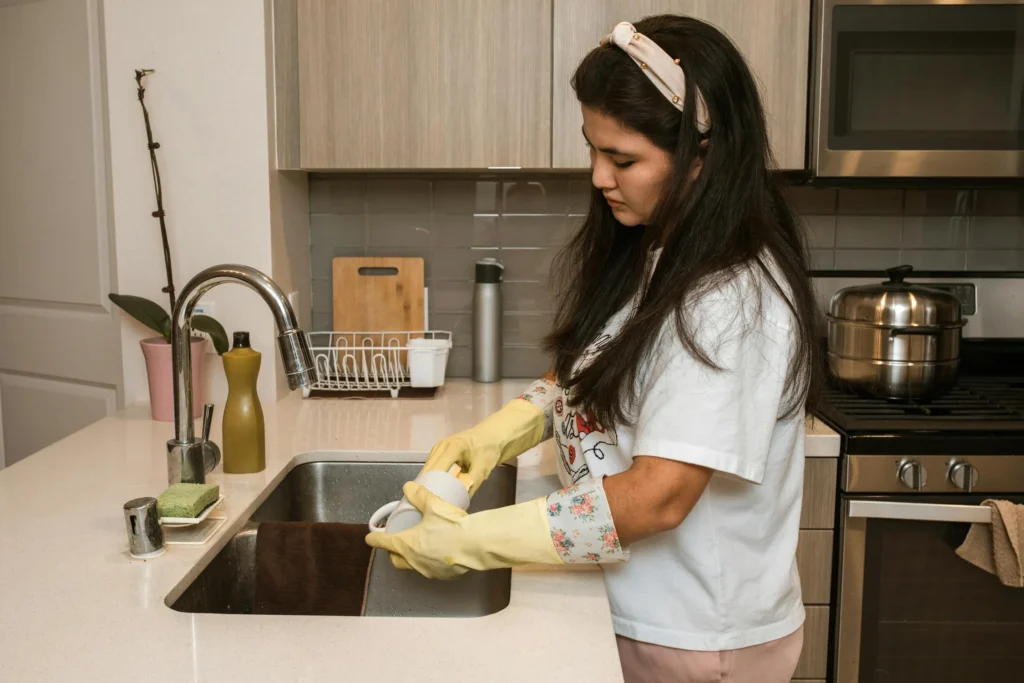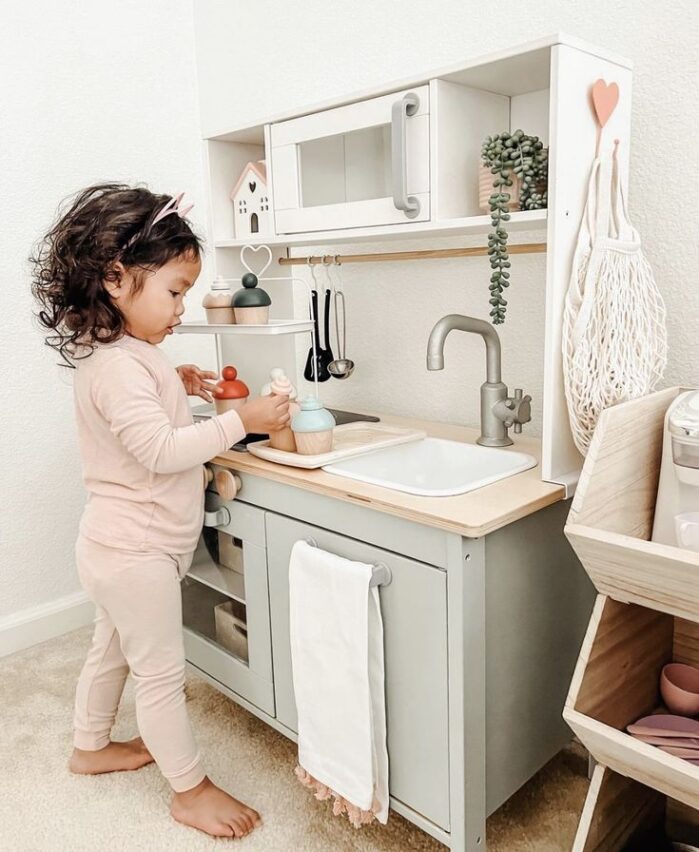Hey folks, keeping a clean kitchen is super important for a healthy home. It might feel like a big job, but with the right kitchen cleaning tips, it’s totally doable.
First off, cleaning your kitchen is more than just wiping down counters. It’s about making your kitchen a place that’s both useful and welcoming. A clean kitchen not only looks good but also keeps your food safe and hygienic. Think of it like this: from getting rid of grease stains to organizing your pantry, there are lots of ways to keep things tidy.
Whether you’re a seasoned chef or a busy parent, these simple steps can make a big difference. Ready to dive in? Let’s transform your kitchen into a clean and enjoyable space. You can achieve the same results with just a few strategic moves.
Essential Supplies For Kitchen Cleaning
Cleaning the kitchen can be a daunting task. But with the right supplies, it becomes much easier. Essential supplies include various tools and solutions that help tackle grease, grime, and dirt. Let’s dive into what you need for a sparkling kitchen.
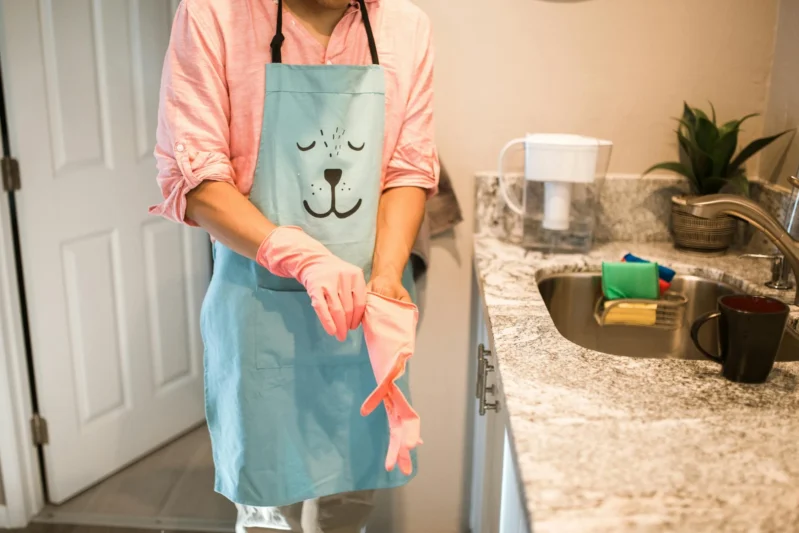
Cleaning Tools
Having the proper cleaning tools is crucial for maintaining a clean kitchen. Here are some must-have items:
- Microfiber Cloths: These cloths are excellent for wiping surfaces without leaving streaks.
- Sponges: Use different sponges for different tasks. A heavy-duty sponge for scrubbing pots and pans, and a softer one for delicate surfaces.
- Scrub Brushes: These are great for cleaning grout, tiles, and stubborn stains.
- Rubber Gloves: Protect your hands from harsh chemicals and hot water.
- Broom and Dustpan: Essential for sweeping up crumbs and debris.
- Mop: A good mop is necessary for keeping the floors clean and shiny.
- Vacuum Cleaner: A handheld vacuum is handy for quick clean-ups and reaching tight spaces.
Cleaning Solutions For Kitchen
Equally important are the cleaning solutions you use. They help break down grease, remove stains, and disinfect surfaces. Here are some essential cleaning solutions:
- All-Purpose Cleaner: A versatile cleaner that can be used on most surfaces.
- Dish Soap: Essential for washing dishes and can also be used to clean countertops.
- Glass Cleaner: Keeps windows and glass surfaces streak-free.
- Disinfectant Spray: Kills germs and bacteria on surfaces.
- Baking Soda: A natural cleaner that can tackle tough stains and odors.
- Vinegar: Great for cutting grease and deodorizing.
- Oven Cleaner: Specifically formulated to clean the inside of your oven.
Daily Cleaning Routine For Kitchen
Keeping a clean kitchen is essential for a healthy and pleasant home. Establishing a daily cleaning routine can save time and effort. This guide will help you maintain your kitchen’s cleanliness with simple, effective tips.
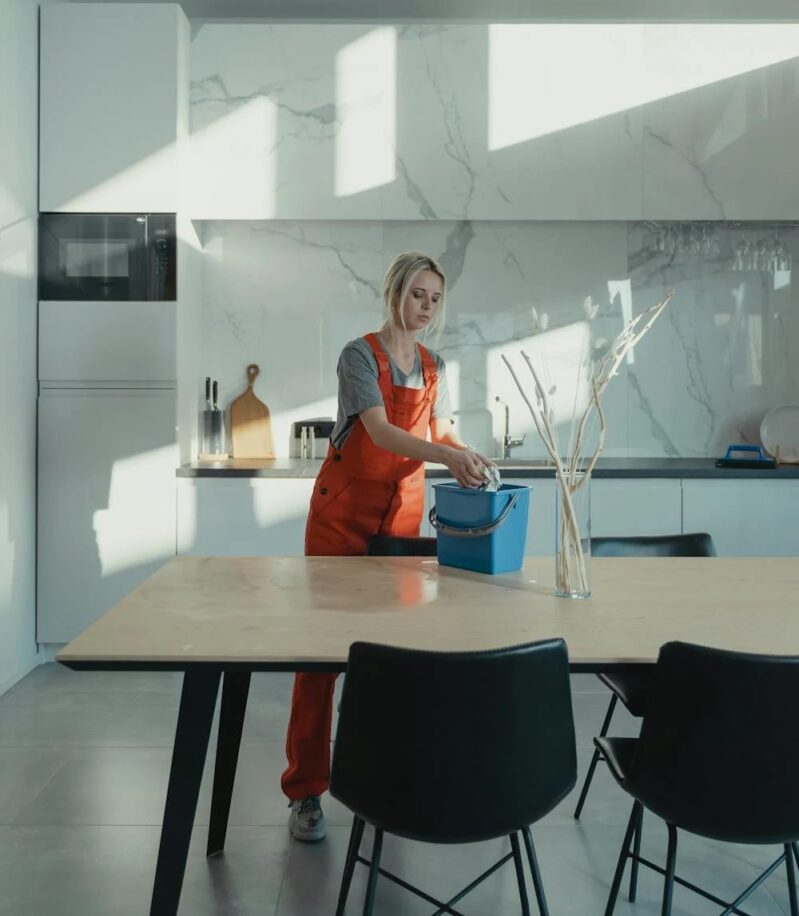
Wiping Surfaces
Regularly wiping surfaces is a key part of any daily kitchen cleaning routine. Start by gathering your cleaning supplies. You’ll need a microfiber cloth, an all-purpose cleaner, and a sponge.
- Counters: Wipe down your counters with an all-purpose cleaner. Pay special attention to areas near the sink and stove where spills often occur.
- Tabletops: Clean your dining table after each meal. This prevents crumbs and sticky spots from becoming a bigger problem.
- Appliances: Give a quick wipe to your stove, microwave, and fridge handles. These spots are touched frequently and can harbor germs.
For a deeper clean, use a microfiber cloth with warm soapy water. This combination can lift grease and grime more effectively. If you encounter stubborn spots, let the cleaner sit for a few minutes before scrubbing.
To make things easier, keep a small caddy with your cleaning supplies under the sink. This way, you can quickly grab what you need and stay on top of the mess.
Also Read: Tips for Painting Kitchen Cabinets
Dish Management
Managing dishes daily is crucial to maintaining a tidy kitchen. Start by emptying the dishwasher each morning. This ensures you have space for dirty dishes throughout the day.
- After each meal: Rinse and load dishes into the dishwasher immediately. This prevents food from drying and becoming harder to clean.
- Hand washing: Some items, like knives and non-stick pans, are best washed by hand. Use warm soapy water and a sponge for these.
- Drying: If you don’t have a dishwasher, use a drying rack for clean dishes. Make sure to put them away once they are dry to keep your counter space clear.
To stay organized, keep a small bin for utensils next to your sink. This helps in quickly sorting and cleaning them. Also, consider using a dish soap dispenser with a sponge holder to save space and keep your sink area neat.
Avoid letting dishes pile up. It can quickly become overwhelming and make your kitchen look cluttered. By dealing with dishes right after use, you maintain a clean and inviting kitchen environment.
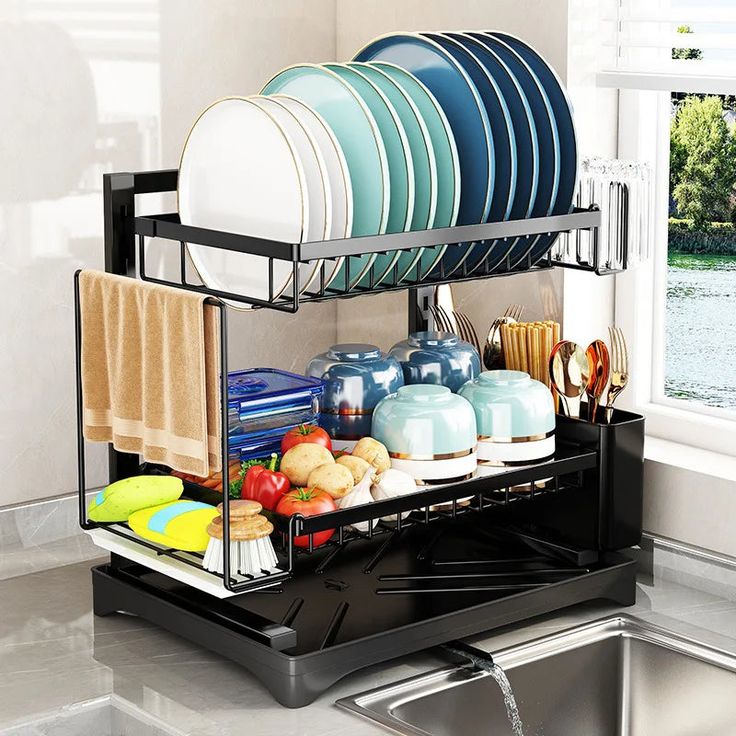
Deep Kitchen Cleaning Tips
Keeping your kitchen clean is essential for a healthy home. While daily cleaning keeps surfaces tidy, deep cleaning ensures every nook and cranny is spotless. Deep cleaning techniques focus on areas often overlooked during routine cleaning. These techniques help maintain a hygienic kitchen environment. Let’s explore some deep cleaning tips for cabinets and appliances.
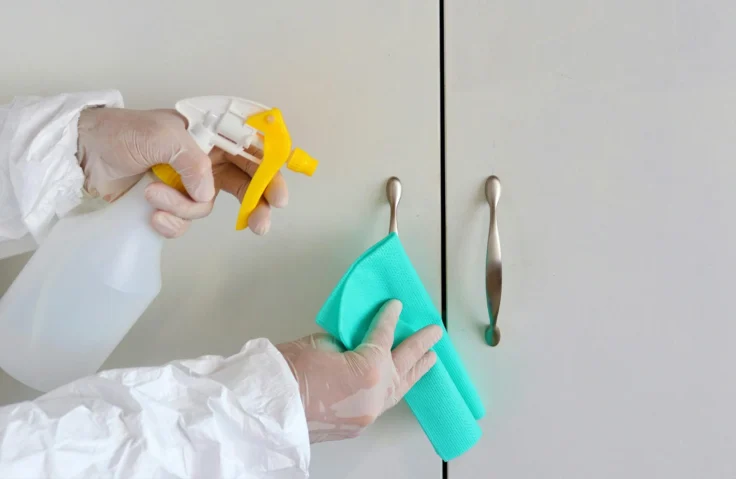
Cabinet Cleaning
Cabinets can accumulate grease, dust, and food particles over time. Deep cleaning your cabinets ensures they stay fresh and organized. Follow these steps for a thorough cabinet cleaning:
- Remove all items from the cabinets.
- Wipe down the shelves with a damp cloth and mild detergent.
- For tough stains, use a mixture of baking soda and water.
- Dry the shelves with a clean towel.
- Clean the cabinet doors with a vinegar and water solution.
- Polish wooden cabinets with a suitable wood cleaner.
- Organize items before placing them back into the cabinets.
Appliance Care
Appliances are the backbone of any kitchen. Keeping them clean ensures they work efficiently and last longer. Here are some deep cleaning tips for common kitchen appliances:
- Refrigerator:
- Empty the fridge and dispose of expired items.
- Remove shelves and drawers, wash with warm soapy water.
- Wipe the interior with a mixture of vinegar and water.
- Dry all parts before reassembling.
- Oven:
- Remove oven racks and soak in warm soapy water.
- Clean the interior with a baking soda paste.
- Wipe off the paste with a damp cloth.
- Clean the racks and place them back.
- Microwave:
- Place a bowl of water and lemon slices inside.
- Heat on high for 3 minutes, then let it sit.
- Wipe the interior with a damp cloth.
Countertop Maintenance
Keeping your kitchen clean is essential for a healthy home. One of the most critical areas to maintain is your countertops. Proper countertop maintenance ensures longevity and keeps your kitchen looking beautiful. Whether you have granite, quartz, or laminate, each material requires specific care.
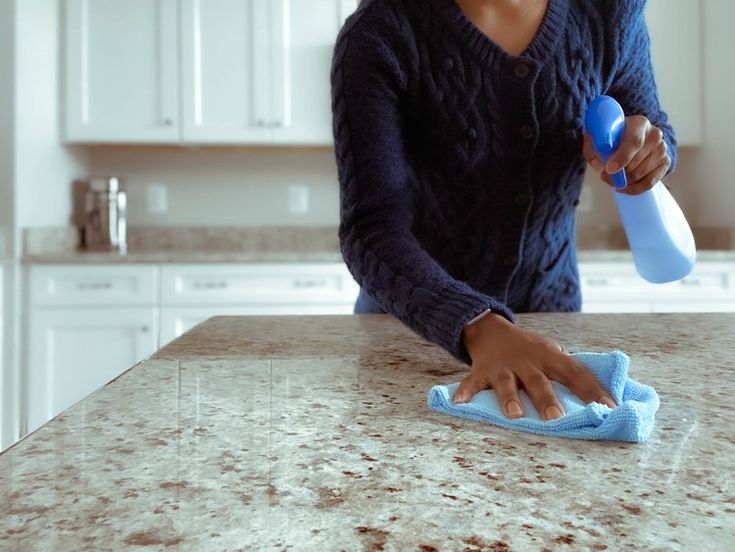
Material-specific Tips
Different countertop materials need different care techniques. Here are some tips for maintaining various types of countertops:
- Granite: Use a mild detergent and warm water for daily cleaning. Avoid acidic or abrasive cleaners as they can damage the surface. Seal the granite once a year to protect it from stains.
- Quartz: Quartz is low-maintenance. Clean with a soft cloth and a gentle cleanser. Avoid harsh chemicals and high pH cleaners.
- Laminate: Use a mild household cleaner. Avoid excessive water as it can seep into seams and cause swelling. Do not use abrasive pads or scrubbers.
- Marble: Marble is porous and can stain easily. Clean with a pH-neutral cleaner. Avoid acidic substances like vinegar or lemon juice.
Stain Removal
Stains can be stubborn, but with the right approach, you can remove them effectively:
- Granite Stains: For oil-based stains, use a paste of baking soda and water. Apply the paste, cover with plastic wrap, and let it sit overnight. For water-based stains, use hydrogen peroxide.
- Quartz Stains: Mix a small amount of bleach with water. Apply it to the stain and let it sit for a few minutes. Rinse thoroughly.
- Laminate Stains: Use a paste of baking soda and water. Gently scrub the stain with a soft cloth. Rinse and dry the area.
- Marble Stains: Make a paste with baking soda and water. Apply to the stain, cover with plastic wrap, and let it sit for 24 hours. Rinse and dry.
Floor Care
Keeping your kitchen clean is essential for a healthy home. One of the key areas to focus on is the floor. Regular floor care not only keeps your kitchen looking spotless but also extends the life of your flooring. Let’s delve into some effective tips on floor care.
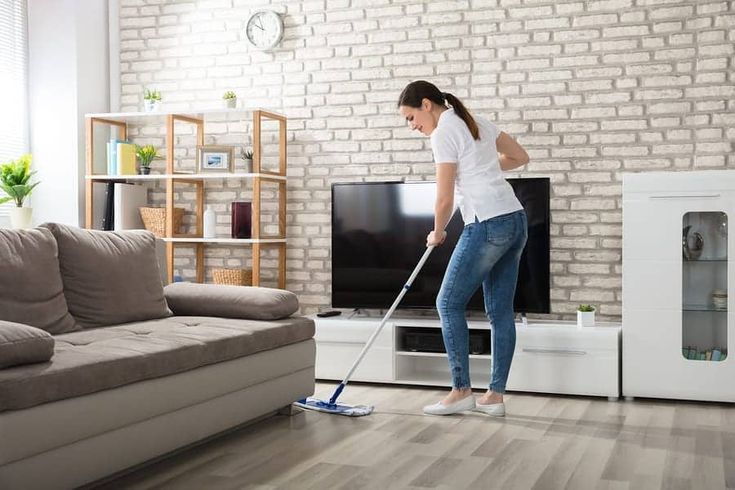
Specific Types Floor Cleaning Tips
The type of flooring in your kitchen determines the cleaning method. Different materials require different care. Here are some common kitchen flooring types and how to care for them:
- Tile Flooring: Tiles are durable and water-resistant. Sweep or vacuum regularly to remove dirt. Use a mild detergent with warm water for mopping.
- Vinyl Flooring: Vinyl is easy to clean and maintain. Sweep daily and mop with a vinegar-water solution for a spotless finish.
- Hardwood Flooring: Hardwood needs gentle care. Sweep with a soft broom and mop with a damp cloth. Avoid using excessive water to prevent damage.
- Laminate Flooring: Laminate mimics hardwood but requires less maintenance. Use a dry mop or vacuum. Clean spills immediately to prevent stains.
Mopping Tips
Effective mopping keeps your kitchen floor clean and shiny. Here are some tips for mopping your kitchen floor:
- Use the Right Mop: Choose a mop suitable for your floor type. Microfiber mops work well for most surfaces.
- Prepare the Floor: Sweep or vacuum the floor before mopping. This prevents dirt from spreading.
- Choose the Right Cleaner: Use a cleaner recommended for your floor type. Avoid harsh chemicals.
- Don’t Over-Wet: Wring out the mop well to avoid excess water. Too much water can damage the flooring.
- Mop in Sections: Divide the floor into sections. Mop one section at a time for thorough cleaning.
- Rinse the Mop Often: Rinse the mop frequently to avoid spreading dirt.
- Dry the Floor: Allow the floor to air dry or use a dry mop to remove excess moisture.
Following these mopping tips ensures your kitchen floor remains clean and in good condition. A little effort goes a long way in maintaining a sparkling kitchen floor.
Organizing The Kitchen
Keeping the kitchen clean and organized can seem like a big task, but with the right tips, it can be manageable and even enjoyable. A well-organized kitchen not only looks good but also makes cooking more efficient and fun. Below are some practical tips to help you organize your kitchen.
Decluttering
Start by decluttering your kitchen. This means getting rid of items you no longer use or need. Here are some steps to follow:
- Go through your cabinets and drawers. Remove items you haven’t used in the last year.
- Check your pantry. Dispose of expired food and donate items you won’t use.
- Sort your utensils. Keep only the ones you use regularly.
Decluttering can make a huge difference. It frees up space and makes it easier to find what you need. Use the table below to help you decide what to keep and what to discard:
| Item | Keep | Discard |
|---|---|---|
| Expired food | ✔ | |
| Rarely used utensils | ✔ | |
| Everyday dishes | ✔ |
Storage Solutions
Once you’ve decluttered, it’s time to focus on storage solutions. Proper storage keeps your kitchen neat and functional. Consider these ideas:
- Use clear containers: Store pantry items like grains, pasta, and snacks in clear containers. This makes it easy to see what you have.
- Label everything: Label containers and shelves. This helps everyone in the household know where things go.
- Maximize cabinet space: Use shelf risers and pull-out trays to make the most of your cabinet space.
Here are some more tips to optimize storage:
- Install hooks or a pegboard for hanging pots and pans.
- Use drawer dividers for utensils and small items.
- Store items by frequency of use. Keep everyday items within easy reach.
Effective storage solutions can transform your kitchen. They make it easier to maintain order and find what you need quickly. By following these tips, your kitchen can be both beautiful and practical.
Natural Cleaning Solutions
Keeping your kitchen clean can be a challenging task. Using natural cleaning solutions makes it easier and safer. These solutions are not only effective but also eco-friendly and economical. Let’s dive into some amazing ways to clean your kitchen using natural ingredients like vinegar and baking soda.
Vinegar Uses
Vinegar is a powerful natural cleaner. It can tackle many kitchen cleaning tasks. Here are some practical ways to use vinegar in your kitchen:
- Clean Countertops: Mix equal parts of water and vinegar in a spray bottle. Spray it on your countertops and wipe with a clean cloth. This mixture disinfects and removes stains.
- Shine Glass: Use undiluted vinegar to clean glass surfaces. Apply it with a cloth and wipe until the glass is clear and streak-free.
- Deodorize Drains: Pour a cup of vinegar down the drain. Let it sit for 30 minutes, then rinse with hot water. This helps to remove bad odors and keep the drain clean.
- Microwave Cleaner: Place a bowl of vinegar and water (1:1 ratio) in the microwave. Heat it for 5 minutes. The steam loosens grime and makes it easy to wipe clean.
Baking Soda Hacks
Baking soda is another fantastic natural cleaner. It’s gentle yet effective. Here are some ways to use baking soda in your kitchen:
- Scrub Surfaces: Make a paste with baking soda and water. Use it to scrub sinks, stoves, and other surfaces. It removes grime and grease without scratching.
- Freshen Fridge: Place an open box of baking soda in your fridge. It absorbs odors and keeps your fridge smelling fresh.
- Clean Oven: Sprinkle baking soda on the oven floor. Spray with water until it’s damp. Let it sit overnight, then scrub and wipe clean. It loosens tough baked-on food.
- Deodorize Carpets: Sprinkle baking soda on your kitchen carpet or rug. Let it sit for 15 minutes, then vacuum. It removes odors and freshens the fabric.
Safety Precautions
Keeping your kitchen clean is crucial for a healthy home. But while cleaning, it’s important to follow some safety precautions. This ensures you avoid accidents and health hazards. Below are essential tips on how to stay safe while cleaning your kitchen.
Chemical Safety
Cleaning your kitchen often involves using various chemicals. These can be harmful if not handled properly. Here are some tips to ensure your safety:
- Read labels carefully before using any cleaning product. Follow the instructions provided.
- Wear gloves to protect your skin from harsh chemicals.
- Ensure good ventilation. Open windows or use exhaust fans to avoid inhaling fumes.
- Never mix different chemicals. For instance, mixing bleach and ammonia can produce toxic gases.
- Store chemicals properly. Keep them out of reach of children and pets, and ensure lids are tightly closed.
Here’s a simple table to help you understand the do’s and don’ts of chemical safety:
| Do’s | Don’ts |
|---|---|
| Read labels | Mix chemicals |
| Wear gloves | Store within reach of children |
| Ensure ventilation | Ignore storage instructions |
By following these tips, you can keep yourself safe while cleaning your kitchen.
Handling Sharp Objects
Sharp objects like knives and scissors are common in the kitchen. Handling them carelessly can lead to injuries. Here are some tips to handle sharp objects safely:
- Keep knives sharp. A dull knife is more dangerous because it requires more force to cut, increasing the risk of slipping.
- Use a cutting board. This provides a stable surface and prevents the knife from slipping.
- Store knives properly. Use a knife block or magnetic strip to keep them secure and easily accessible.
- Cut away from your body. Always direct the knife away from yourself to avoid accidental cuts.
- Pay attention. Stay focused while using sharp objects. Avoid distractions like phones or conversations.
Here are some common mistakes to avoid when handling sharp objects:
- Using a dull knife
- Not using a cutting board
- Leaving knives in the sink
- Not paying attention
By following these guidelines, you can minimize the risk of injuries in your kitchen.
Frequently Asked Questions
How Often Should I Clean My Kitchen?
You should clean your kitchen daily to maintain hygiene. Wipe surfaces and clean dishes every day. Perform a deep clean weekly.
What Are The Best Kitchen Cleaning Products?
Use natural products like vinegar and baking soda. They are effective and safe. Commercial cleaners are also useful for stubborn stains.
How To Remove Grease From Kitchen Surfaces?
Use a mixture of baking soda and water. Apply it to the greasy area. Wipe with a damp cloth.
Can I Use Lemon For Kitchen Cleaning?
Yes, lemon is a natural cleaner. It helps remove stains and odors. Use it on cutting boards and countertops.
Conclusion
Cleaning your kitchen doesn’t have to be hard. Start with one task at a time. Wipe counters, clean appliances, and sweep floors. Use simple, effective cleaning products. Regular maintenance keeps your kitchen fresh. Make a routine and stick to it.
A clean kitchen is a happy kitchen. Enjoy cooking in a spotless space. Now, it’s time to put these tips to use. Happy cleaning!

